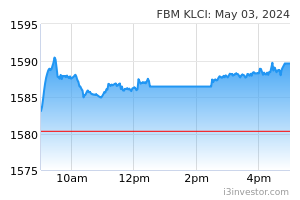MISC Berhad - Gas & Asset Disappoints
kiasutrader
Publish date: Fri, 15 Nov 2024, 05:29 PM
MISC's 9MFY24 results were disappointing, primarily due to weaker-than-expected performance in the gas & asset solutions division, impacted by soft LNG spot rates. While the petroleum shipping segment continued to show resilience, rates appear to have peaked. Looking ahead, the gas & asset solutions division is expected to face a subdued earnings outlook in the near to medium term, reflecting ongoing challenges in the LNG market.
We cut our FY23-24 earnings forecasts by 4% each, reduce our TP by 4% to RM7.78 (from RM8.11) but maintain our MARKET PERFORM call.
Below expectations. MISC's 9MFY24 core net profit, excluding non- recurring items (RM26.5m unrealised forex gain, RM44.1m gain on other investments, and RM66.7m impairment loss on trade receivables), fell short at only 69% of our full-year forecast and 64% of the consensus estimate. The deviation was primarily attributable to weaker-than-expected performance in the gas & asset solutions segment, where several LNG vessels experienced lower charter rates following the expiry of prior long-term contracts.
Offshore and gas & asset solutions weakened. YoY, revenue for 9MFY24 edged up by 0.6%, driven by higher contributions from the petroleum shipping division, benefiting from stronger tanker rates, and increased work orders in the marine & heavy engineering segment.
However, the gains were offset by weaker revenue in the LNG vessel (due to lower earning days and spot rates for vessels on spot) and offshore divisions. Core profit surged 17.0% YoY, supported by improved margins in the petroleum shipping segment and marine & heavy engineering division due to better contract cost management.
QoQ weakness recorded. On a QoQ basis, MISC's revenue declined by 11.0%, mainly due to weaker performance in the petroleum shipping segment, as tanker rates softened, and lower revenue in the offshore business segment. Sequentially, core profit fell 44.6%, impacted by lower contributions from the petroleum shipping, offshore, and marine & heavy engineering segments.
Briefing highlights. Key takeaways from MISC's analyst briefing include the following:
- The global demand outlook for LNG shipping will remain subdued due to low demand for Asia and the high LNG vessel supply in Europe. We expect the spot rates to remain largely subdued in the current ranges at USD40,000 per day as new vessel deliveries are still expected to be high in the next few years but the demand will be largely flattish to slightly growing as additional LNG liquefaction capacity is not expected to meet the increase in vessel supply.
- MISC has entered into a non-binding Memorandum of Understanding (MOU) with ARMADA (OP; TP: RM0.60) to explore a potential merger of their FPSO businesses over the next nine months. While details remain undisclosed, the merger may involve a share swap arrangement of which a new entity could be formed upon completion and will remain listed, per announcement. At this stage, we view the potential deal to be largely neutral for MISC, given the limited synergies expected with its existing FPSO assets. However, the merger could be more advantageous for ARMADA, as it would enable the company to leverage MISC's stronger balance sheet to pursue larger FPSO projects.
Forecasts. We cut our FY24-25 earnings forecasts by 4% each to reflect lower DCR assumptions (-7.5% for average DCR assumed) to account for lower DCR for the 6 LNG vessels on spot) for gas & asset solutions division to account for the weaker LNG spot markets.
Correspondingly, we cut our SoP-TP by 4% to RM7.78 (from RM8.11) after the DCR adjustment for the gas & asset solution division. There is no change to our valuation based on ESG given a 4-star ESG rating as appraised by us (see Page 5).
We like MISC due to its: (i) recent fleet expansion and modernization, (ii) success in securing mega FPSO projects (i.e. Mero- 3) and new contracts from international clients, (iii) decent dividend yield, and (iv) long-term growth trend in LNG business due to structural increase in demand. However, demand for petroleum tankers seems to have peaked with charter rates peaking in 2QFY23. Maintain MARKET PERFORM.
Risks to our call include: (i) lower-than-expected utilisation and spot rates for the petroleum fleet, (ii) additional cost overruns and project delays for Mero-3, and (iii) further production cuts by major oil producers.
Source: Kenanga Research - 15 Nov 2024
Related Stocks
Market Buzz
2025-01-10
MISC2025-01-10
MISC2025-01-10
MISC2025-01-09
MISC2025-01-09
MISC2025-01-09
MISC2025-01-08
ARMADA2025-01-08
MISC2025-01-08
MISC2025-01-07
ARMADA2025-01-07
MISC2025-01-06
MISC2025-01-06
MISC2025-01-04
ARMADA2025-01-03
MISC2025-01-02
MISC2025-01-02
MISC2025-01-02
MISC2025-01-01
MISC2024-12-31
MISCMore articles on Kenanga Research & Investment
Created by kiasutrader | Jan 10, 2025
Created by kiasutrader | Jan 10, 2025
Created by kiasutrader | Jan 10, 2025
Created by kiasutrader | Jan 10, 2025
Created by kiasutrader | Jan 10, 2025
























